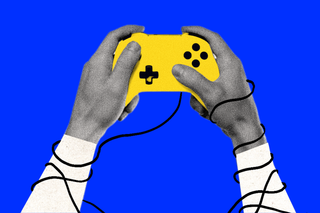
When Gaming Ceases to Be Relaxing and Becomes a Disorder Instead
Gaming disorder is recognized both by the ICD-11 and the DSM-5 TR as a behavior causing “significant impairment or distress” in one’s life.

Coming a long way from the pixelated adventures on chunky consoles, gaming, today, has evolved into a global phenomenon — captivating millions of players around the world through playstations, xboxes, or simply, their mobile devices. In a society ravaged by chronic loneliness, gaming offers an immersive and gratifying respite from the daily grind. However, there is a darker side to this digital escape: a 13-year-old from China just wiped savings worth $64,000 (almost Rs. 53 lakhs) off her mother’s bank account, reportedly, to “fund her gaming addiction.”
The phenomenon of a pastime meant to relax, becoming a source of distress and addiction, is recognized by both the 11th Revision to the International Classification of Diseases (ICD-11) published by the World Health Organization and the text revision to the Diagnostic and Statistical Manual of Mental Disorders (DSM-5-TR) published by the American Psychiatric Association. The former defines it as “a pattern of gaming behavior characterized by impaired control over gaming, increasing priority given to gaming over other activities, to the extent that gaming takes precedence over other interests and daily activities, and continuation or escalation of gaming despite the occurrence of negative consequences,” and the latter states that in order to qualify as a disorder gaming must cause “significant impairment or distress” in an individual’s life.
“I started playing when I was around nine years’ old… I played because I found it fun, but after a while I played mostly because I preferred it over socializing and confronting my problems,” Griffin, whose personal information was redacted to protect his privacy, told NPR, describing his tryst with the disorder.
Experts believe that the impact of gaming addictions on our brains mirror that of other, more recognized addictions. “In drugs, the person gets activated when they see that syringe or they see that dealer… It is exactly the same circuitry that gets involved [in video games],” says Nora Volkow, director of the National Institute on Drug Abuse, a federal research agency in the U.S. Explaining how one get’s addicted to gaming, she adds, “You don’t know when you will be able to kill the adversary or find the treasure that the video game is offering — but there is that moment when you do. That becomes reinforced… dopamine goes up and it keeps you going.” In other words, games employing reward systems can foster addictive tendencies — with he constant desire for achievements, level-ups, and in-game rewards, hijacking the brain’s pleasure and reward centers.
Related on The Swaddle:
Video Gaming Can Benefit Mental Wellbeing, Oxford Researchers Find
It’s not just gory and violent games that spawn gaming disorders, though; the relatively cheerful and innocuous ones — like Candy Crush — can, too. Recalling a flight she was on, Volkow says, “I would say 30% of the plane was playing this Candy Crush. And they would have these little sounds and colors. So you get conditioned to that sound and the color, and those become reinforcing. And that’s exactly how our brain works.”
The social side to gaming, too — not just online, but also offline — can hook people through the fear of missing out and a desire to belong by maintaining social connections with other members of the gaming community. This can make an indiviual more susceptible to peer pressure — as it did with the teenager from China — leading to excessive gaming behaviors.
As a result, an individual caught in the throes of a gaming disorder may spend hours playing. However, whether or not one’s gaming behavior qualifies as a disorder, is not determined by the number of hours spent gaming, but rather by the impact it has on their life and how much self-control an individual is able to exercise over their gaming habits.
However, there continues to be a lack of consensus among clinicians and researchers on whether excessive gaming per se indicates an addiction, or whether it is simply a symptom of underlying mental health disorders like depression and anxiety. The sense of achievement, escapism, and camaraderie that gaming offers can making it appealing to individuals facing stress, anxiety, or depression. Consequently, they argue, people who are already vulnerable to mental health issues, may be drawn to seek solace in the virtual world.
Related on The Swaddle:
What Is the Role of a Bystander in Gender‑Based Violence?
Many researchers also worry that pathologizing a normal recreational behavior would simply erect a new stigma. Meanwhile, others maintain that acknowledging the fact that gaming can devolve into a disorder can allow those affected by it to seek help.
With increased research, however, experts have been forced to switch sides, too. “I came to this issue out of a place of deep skepticism: addicted to video games? That can’t be right. [But] I’ve been forced by data to accept that it’s a problem,” says Douglas Gentile, an associate professor of developmental psychology at Iowa State University, who has been researching the effects of media on children. “Addiction to video games and internet use, defined as ‘serious dysfunction in multiple aspects of your life that achieves clinical significance,’ does seem to exist.”
Whether excessive gaming is symptom of another disorder or a disorder in itself begins to sound redundant, however, on the face of news about individuals literally collapsing to their death after playing almost non-stop, with barely any breaks for hours on end — as it happened with a man in South Korea, another in Taiwan, and many, many others around the world whose deaths prompted a 2022 study into “life-threatening cardiac arrhythmia and sudden death during electronic gaming.” As researchers have already known, gaming can often culminate in sleep deprivation, insomnia and circadian rhythm disorders.
And so, irrespective of the conclusion of this debate, as Anya Kamenetz, a journalist and education correspondent, wrote, “The word ‘addiction’ may currently be attracting controversy, but you don’t need a doctor’s official pronouncement to work on putting the devices down more often — or to encourage your kids to do so as well.”
Devrupa Rakshit is an Associate Editor at The Swaddle. She is a lawyer by education, a poet by accident, a painter by shaukh, and autistic by birth. You can find her on Instagram @devruparakshit.
Related


There’s a Lot More to ADHD Than Just a Lack of Focus
